SCBC students win Silver Award of Advertising Festival of Chinese College Students
Recently, the organizing committee of the Academy Award of Advertising Festival of Chinese College Students announced the results of the Fall 2021 Call for Entries. Students of SCBC’s School of New Media and International Communication had turned out to be dazzling stars in their debut at the festival! Among more than 400,000 entries from over 1,240 colleges and universities nationwide, 148 entries from the School of New Media and International Communication have received awards, including one national silver award, 26 excellence awards and 121 finalist awards. This is the first time that SCBC won a silver award in the Academy Award! The School of New Media and International Communication has also been recognized with Annual Advertising Education Promotion Award of the Academy Award of Advertising Festival of Chinese College Students 2021.
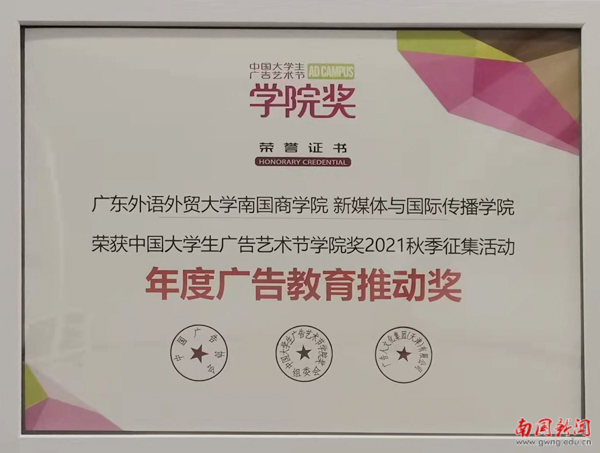
SCBC students’ award-winning works were diverse and creative, including 78 print posters, 52 advertising copy-writing works, 8 short videos, 5 integrated designs, 4 commercials, and 1 cartoon work. Chen Yun and Zou Yijiang's poster Three Parts of Chinese Civilization at Guilin Sanjin was particularly good, elegant and creative, which stood out from many other works and won a Silver Award (there were only one Gold Award and two Silver Awards for posters).
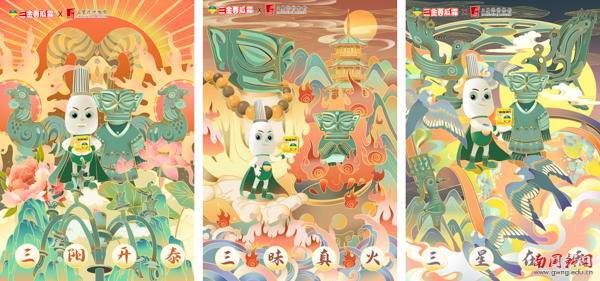
The Academy Award of Advertising Festival of Chinese College Students (hereinafter referred to as the Academy Award) is the grand prize of China's advertising industry approved by the central government and ratified by the working group of the State Council for evaluation and commendation. It is the only national student advertising art event approved by the State Administration for Industry and Commerce, sponsored by the China Advertising Association and organized by the ADMEN magazine. The entries to the Academy Award are directly collected by famous brands at home and abroad, and the winning works can be immediately marketed and commercialized, so that students and brands can work closely to make the goal of applying what they have learned a reality.
Meeting held to discuss issues regarding the Research Center for Multilingual Translation and Interpretation of Chinese Culture
On November 17, a meeting was held in the International Conference Hall to discuss issues regarding the Research Center for Multilingual Translation and Interpretation of Chinese Culture(hereinafter referred to as the Center), a key research base of humanities and social sciences for higher education institutions in Guangdong province. Executive President Wang Hua and Supervisor General Gu Yeli and all the members of the Center attended the meeting.
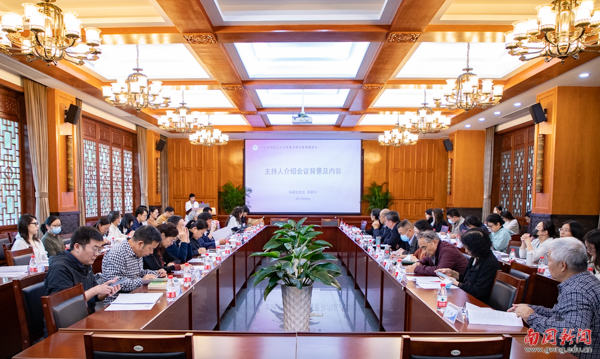
The Center was approved on August 26, 2021 as a key research base of humanities and social sciences for higher education institutions in Guangdong province. The Center effectively integrates the advantageous resources of SCBC’s four schools and one department, namely, the School of English Language and Culture, the School of Asian Languages and Cultures, the School of European Languages and Cultures, the School of Chinese Language and Culture, and the Department of College English. It implements a two-level management system of “the Center-Research Team. That is, under the Center, three research teams have been created and people in charge of them appointed, namely English Research Team, headed by Prof. Chen Sheng, also deputy dean of the School of English Language and Culture, Asian Languages Research Team headed by Prof. Chi Shengnyu, also dean of the School of Asian Languages and Cultures, and European Languages Research Team headed by Associate Prof. Yu Fengying, also deputy dean of the School of European Languages and Cultures.
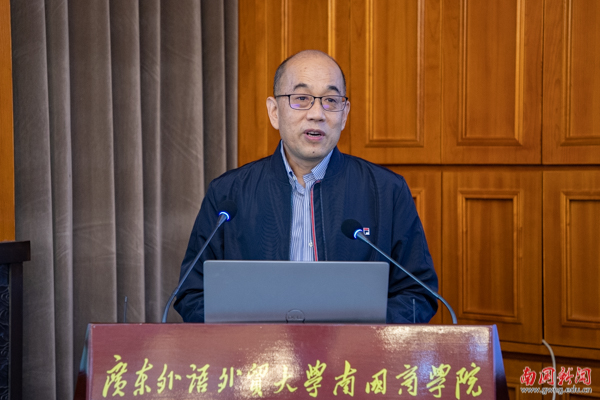
Prof. Wen Binli, director of the Center, reported his proposed work scheme for the Center to the meeting. The work scheme includes seven parts: the tasks, the goals, the organizational structure, the operations and responsibilities, the research directions and fields, the division of work among research teams, and the support arrangements. He pointed out that the work scheme could be summarized into five major tasks, four goals, four research directions and three research teams. He said that the Center will be managed at the college level under the leadership of the vice president in charge of scientific research, and coordinated by the Research Office, while the Center is responsible for operation and output, and will work together with all parties involved to deliver on the blueprint of this work scheme.
Afterwards, the participants had an in-depth exchange of views on the introduction and employment of full-time and part-time researchers at the Center, the feasibility of the major goals, the practicability of the expected results of each research team, the assessment standards and requirements, the management of funds, and the resolution of the contradiction between the research and teaching tasks of the researchers. The participants unanimously agreed that the work scheme of the Center is feasible with clear goals and tasks, logical structure, and appropriate positioning.
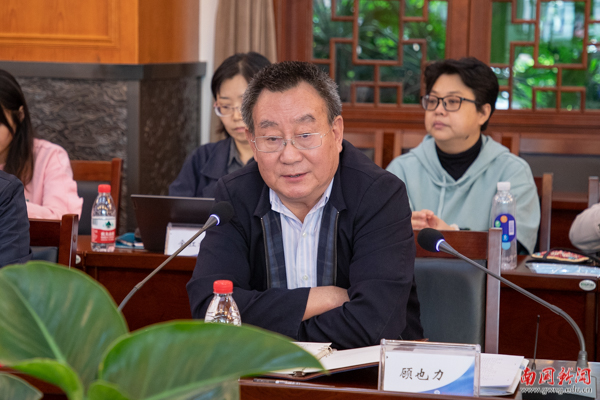
Supervisor Gu Yeli made a concluding speech, emphasizing that the Center should strengthen forward-looking thinking, global planning, strategic layout and overall promotion, dedicate itself to the four major goals, five major tasks, four major research directions while making joint efforts to satisfy the assessment requirements made by the Provincial Education Department of the Center, and turn the blueprint of work scheme for the Center into reality step by step. To this end, he put forward three requirements: first, to raise the political standing of the Center and focus on the academic pursuits of the Center; second, to draw on the overall development of the college and give full play to the functions of the Center; and third, to bear in mind the responsibilities and positioning of the Center and carefully implement the tasks of the Center.
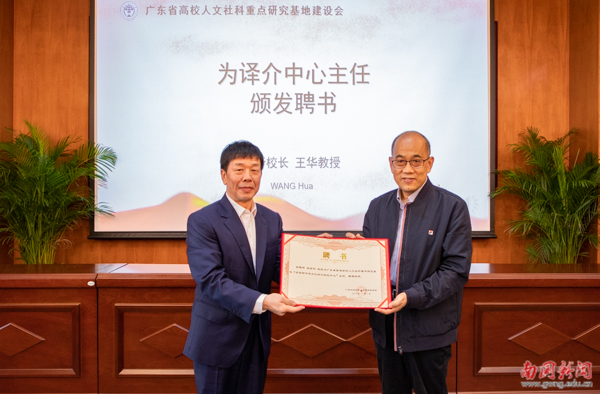
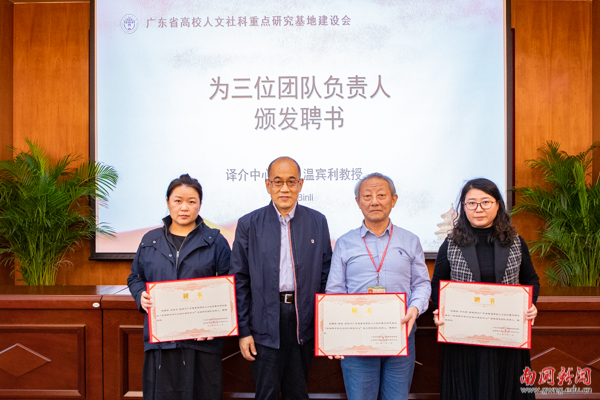
At the meeting, Executive President Wang Hua awarded the appointment letter to Professor Wen Binli, director of the Center. Prof. Wen Binli then awarded the appointment letters to three research team leaders.
Ceremony held to launch the centenary time capsule and to celebrate the 25th anniversary of SCBC
On the bright, sunny day of November 20, in the presence of many people at the Cultural Square, SCBC held a grand ceremony for the launch of the 100-year time capsule (1996-2021-2096) and the celebration of its 25th anniversary.
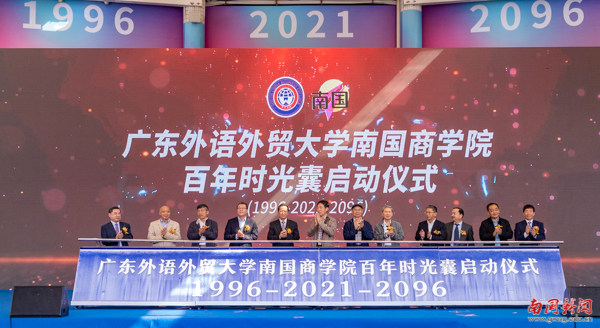
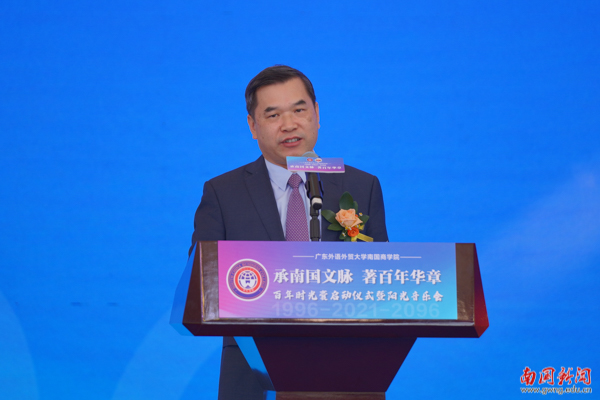
Present on this important occasion were Professor Jiao Fangtai, vice president of Guangdong University of Foreign Studies and president of South China Business College, Professor Wang Hua, executive president of South China Business College, all other members of the SCBC leadership, some retired leaders of SCBC, many guests from all walks of life who have long cared about and supported the development of SCBC, representatives of alumni from all over the world, and representatives of teachers and students.
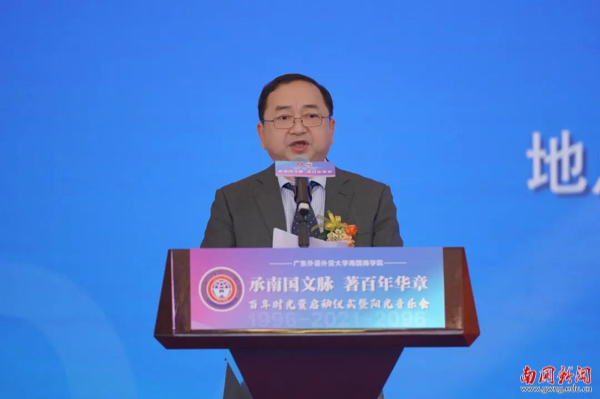
Chair of the Board Ding Xiaojun delivered a speech. He said that the development of South China Business College in the past 25 years had invoked many mixed feelings which he could only expressed in two words: thank you. He would like to say thank you to the Party for the country's reform and opening up, to the government for the good policy of education, to the provincial education department for its attention and support, to leaders at all levels and friends from all walks of life for their love and help, to the former and current faculty and staff, to all the alumni, and finally, and to Guangdong University of Foreign Studies. “25 years have passed, and South China Business College has ushered again into a new stage of historical development with an aim to achieve smooth transition of delinking itself from GUDFS and embark on a new journey as a stand-alone institution of higher learning with its 14th Five-Year Plan.” He said, “Today, we gather here at South China Business College to launch the centenary time capsule, remembering the footprint of past efforts and inspiring the dreams of next 100 years. In retrospect, South China Business College has gone through changes, for example, changes of name and campus, but its spirit of pursuing excellence and daring to be the first remains the same, its original aspiration to educate and nurture specialized and professional citizens for the country remains the same, and SCBCers’ sentiment of unity and solidarity remains the same.” He stressed that after the delink, the tradition, the spirit, and the soul of South China Business College will continue to shine. The board of directors will also continue to support the development of the college and increase investment to optimize campus facilities, moving South China Business College towards the goal of building itself into a high-level century-old university.
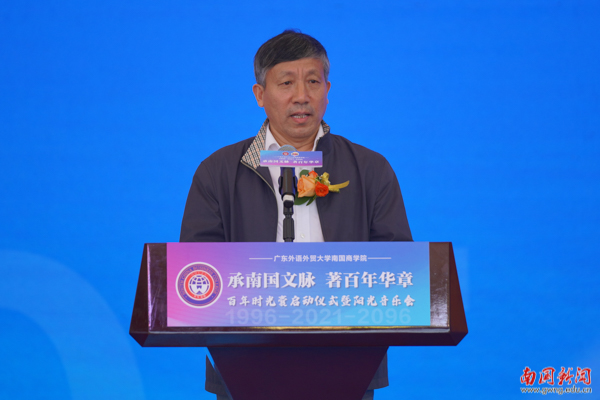
President Jiao Fangtai and President Zhao Kang of Guangdong Private Education Association delivered speeches respectively. Professor Zhu Zijiang, dean of the School of Information Science and Technology, and Zheng Yinlong, alumnus of Class of 2006 Japanese major, spoke as representatives of teachers and alumni respectively.

In the presence of all people in the audience, the veteran and current leaders jointly pushed the lever to officially kick off the 100-year time capsule. At the time, the winners of the 3rd Moving Figures of South China Business College were also honored. They were Prof. Xu Feng, dean of the School of European Languages and Cultures, Prof. Ke Hanlin, former and the first dean of the School of Chinese Language and Culture, and Prof. Zhu Jianliang, the first director of library of South China Business College and the first editor-in-chief of South China Business College Journal of Academic Research.
South China Business College has gone through 25 years of hard work and experienced the changes of its location and name for four times in its journey of development from an all-girls school with only one program and 137 students when it was founded in 1996 to a full-time undergraduate higher institution with 44 undergraduate programs and nearly 10,000 students. It has gradually put into shape its own philosophy and characteristics of education and has been increasingly recognized thanks to its significantly improved quality and level of education. Now it has found its own way of achieving leapfrog development as a private university distinctive with foreign languages education. At the new historical juncture, the launch of the 100-year time capsule symbolizes the beginning of a new journey, and all SCBCers will strive forward with passion and dedication to achieve new glorious successes along the way of building a high-level private university with distinctive features.